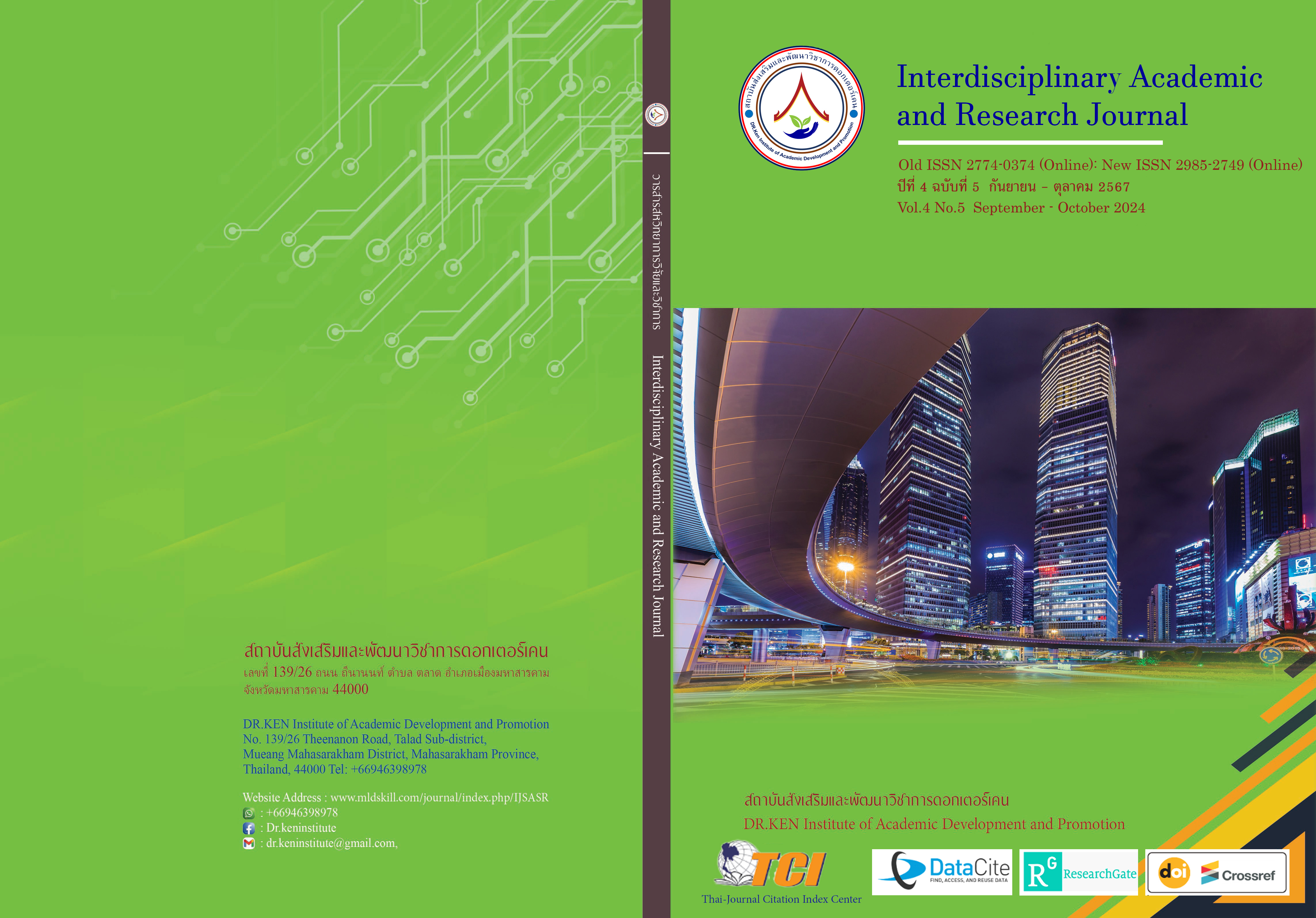A Study on the Essential Needs for Developing the Bachelor of Education Curriculum in Physical Education
DOI:
https://doi.org/10.60027/iarj.2024.282228Keywords:
Bachelor of Education Curriculum;, Physical Education;, Essential NeedsAbstract
Background and Aims: This study aims to examine the essential needs and guidelines for the development of the Bachelor of Education curriculum in Physical Education. In establishing educational programs, especially in this field, curriculum developers must understand the needs of stakeholders to create a curriculum that is relevant and meets the expectations of graduates' users.
Methodology: A qualitative research approach, utilizing semi-structured in-depth interviews. The sample for this study consists of 30 individuals divided into three groups: Group 1 included graduates users such as school directors and educational personnel (regular teachers) 10 peoples; Group 2 comprised undergraduate students majoring in Physical Education 10 peoples; and Group 3 consisted of secondary school students interested in the field 10 peoples. The collected data were analyzed using content analysis methods.
Results: The findings revealed that all three groups provided consistent suggestions and needs across four key areas: knowledge, skills, characteristics of Physical Education teachers, and ethical considerations. In terms of knowledge, it was essential for educators to possess a foundational understanding of bodily movement, the structure and functions of various body parts, sports rules and regulations, as well as basic first aid in sports. Regarding skills, emphasis should be placed on the ability to effectively convey theoretical and practical knowledge, alongside competencies in learning management and creative teaching design. Additionally, skills in organizing sports competitions were highlighted.
Conclusion: In terms of characteristics, it is crucial for educators to exemplify good behavior both inside and outside the educational institution, demonstrate effective leadership, appropriately respond to situations, and possess strong interpersonal skills. Finally, with respect to ethics, teachers should adhere to professional ethics, avoid engaging in vices, and embody the four sublime states of mind. In summary, the integration of knowledge, skills, characteristics, and ethical principles is vital in cultivating quality Physical Education teachers, which positively impacts future learning outcomes.
References
จริญญา สมานญาติ. (2564) การพัฒนาหลักสูตร. (พิมพ์ครั้งที่ 2). กรุงเทพฯ : โอ.เอส.พริ้นติ้ง เฮ้าส์. 271 หน้า
ชวลิต ชูกำแพง. (2559). การวิจัยและพัฒนาหลักสูตร แนวคิดและกระบวนการ. กรุงเทพ ฯ : สำนักพิมพ์จุฬาลงกรณ์มหาวิทยาลัย
ณัฐกานต์ ขันทอง. (2565). ความต้องการจัดการเรียนรู้พลศึกษาในโรงเรียนสังกัดเทศบาลเมืองจังหวัดศรีสะเกษ. วารสารสังคมศาสตร์เพื่อการพัฒนาท้องถิ่น มหาวิทยาลัยราชภัฏมหาสารคาม, 6(2), 164–169.
ธนินทร ยอดมงคล (2564). "การมีส่วนร่วมของผู้มีส่วนได้ส่วนเสียในการพัฒนาหลักสูตรการศึกษา. วารสารการศึกษาและการพัฒนา, 11(2), 75-90.
ประเสริฐ สุขประเสริฐ. (2562). การพัฒนาหลักสูตรพลศึกษา: แนวทางและแนวคิดใหม่. สำนักพิมพ์การศึกษา.
พงษ์เอก สุขใส. (2561). ครูพลศึกษาในศตวรรษที่ 21. วารสารวิชาการมหาวิทยาลัยฟาร์อีสเทอร์น, 12(1), 8–21.
พันธ์ศักดิ์ พลสารัมย์. (2549). การศึกษาแนวโน้มการวิจัยและพัฒนาการศึกษาสำหรับอนาคต. รายงานการวิจัย. สำนักงานเลขาธิการสภาการศึกษา. กรุงเทพฯ : บริษัทหวานกราฟฟิคจำกัด.
วารีรัตน์ แก้วอุไร. (2564). การพัฒนาหลักสูตร : จากทฤษฎีสู่การปฏิบัติ. พิษณุโลก: สำนักพิมพ์มหาวิทยาลัยนเรศวร. 366 หน้า
วิชัย วงษ์ใหญ่. (2554). การพัฒนาหลักสูตรระดับอุดมศึกษา (พิมพ์ครั้งที่ 2). กรุงเทพฯ: อาร์แอนด์ปรินท์จํากัด.
สงัด อุทรานันท์. (2542). พื้นฐานและหลักการพัฒนาหลักสูตร. กรุงเทพฯ : มิตรสยาม
สิทธิศักดิ์ บุญหาญ. (2566). การพัฒนาหลักสูตรศึกษาศาสตรบัณฑิต สาขาวิชาพลศึกษา มหาวิทยาลัยการกีฬาแห่งชาติ. วารสารวิชาการมหาวิทยาลัยการกีฬาแห่งชาติ, 15(3), 255–268.https://he02.tci-thaijo.org/index.php/TNSUJournal/article/view/259618
อริสา นพคุณ, บรรจบ บุญจันทร์, และสุวิมล ตั้งประเสริฐ. (2561). การพัฒนาสมรรถนะครูในสถานศึกษา สังกัดสำนักงานเขตพื้นที่การศึกษาประถมศึกษานครราชสีมา. วารสารชุมชนวิจัย, 12(3), 232–244.
อังคณา อิ่มใจ (2562). "การพัฒนาหลักสูตรพลศึกษาให้ทันสมัยเพื่อการเรียนรู้ที่มีประสิทธิภาพ." วารสารวิจัยทางการศึกษา, 15(2), 45-60.
Asigbee, F.M., Whitney, S.D., & Peterson, C.E. (2018). The Link Between Nutrition and Physical Activity in Increasing Academic Achievement. Journal of School Health, 88(6), 4.7-415.
Duta, N., Panisoara, G., & Panisoara, I. (2015). The Effective Communication in Teaching. Diagnostic Study Regarding the Academic Learning Motivation to Students. Procedia - Social and Behavioral Sciences, 186, 1007-1012.
Graham, G. (2008). Teaching Children Physical Education: Becoming a Master Teacher. Illinois: Human Kinetics.
Martin, A.J. & Dowson, M. (2009) Interpersonal Relationships, Motivation, Engagement and Achievement: Yields for Theory, Current Issues and Educational Practice. Review of Educational Research, 79, 327-365. https://doi.org/10.3102%2F0034654308325583
Weinberg, R.S., & Gould, D. (2011). Foundations of Sport and Exercise Psychology. Illinois: Human Kinetics.
Wallhead, T. L., & Buckworth, J. (2004). The Role of Physical Education in the Promotion of Youth Physical Activity. Quest, 56(3), 285–301. https://doi.org/10.1080/00336297.2004.10491827
Weiss, M. G., Ramakrishna, J., & Somma, D. (2006). Health-related stigma: Rethinking concepts and interventions 1. Psychology, Health & Medicine, 11(3), 277–287. https://doi.org/10.1080/13548500600595053
Downloads
Published
How to Cite
Issue
Section
License
Copyright (c) 2024 Interdisciplinary Academic and Research Journal

This work is licensed under a Creative Commons Attribution-NonCommercial-NoDerivatives 4.0 International License.
Copyright on any article in the Interdisciplinary Academic and Research Journal is retained by the author(s) under the under the Creative Commons Attribution-NonCommercial-NoDerivatives 4.0 International License. Permission to use text, content, images, etc. of publication. Any user to read, download, copy, distribute, print, search, or link to the full texts of articles, crawl them for indexing, pass them as data to software, or use them for any other lawful purpose. But do not use it for commercial use or with the intent to benefit any business.
















.png)


